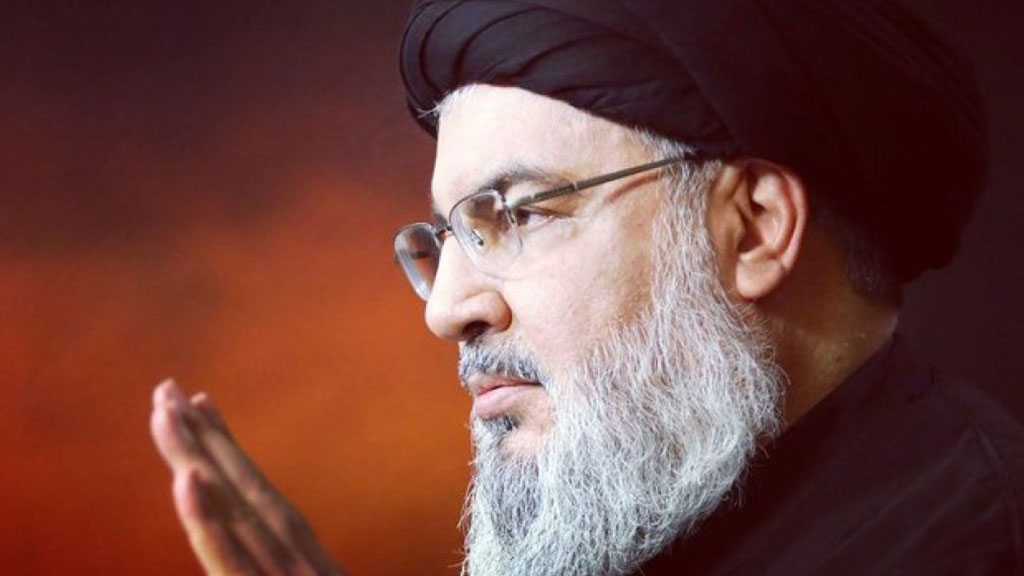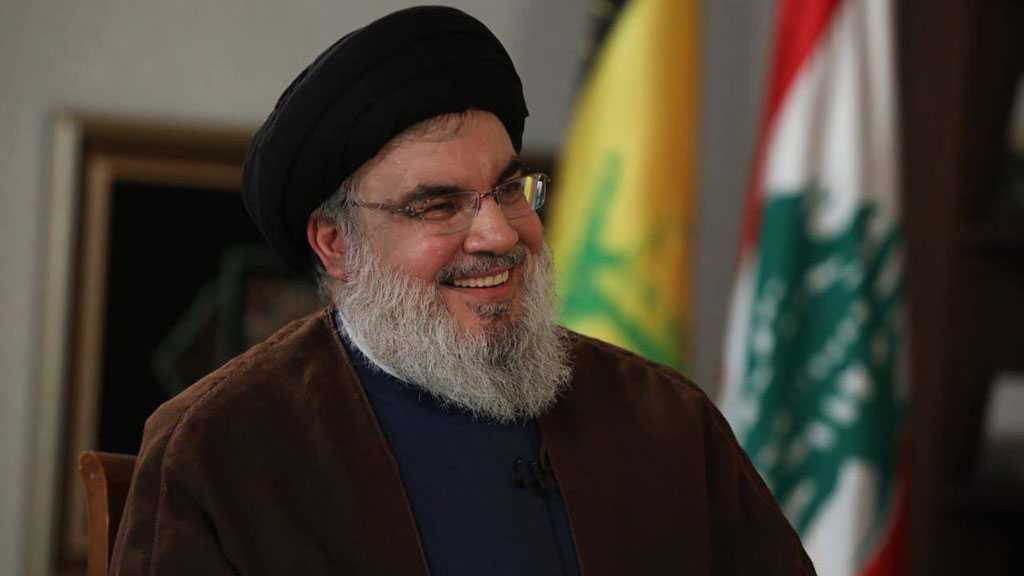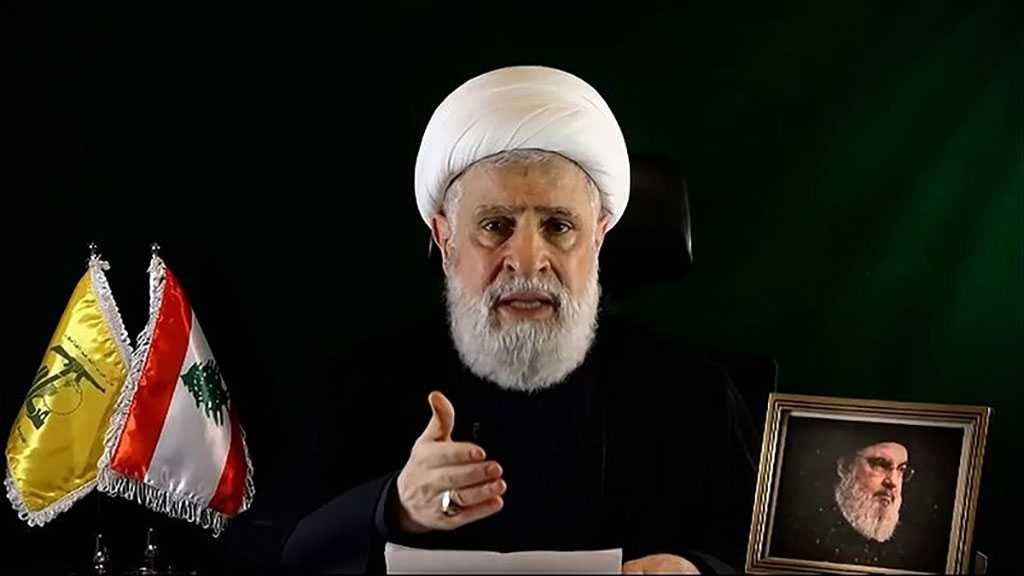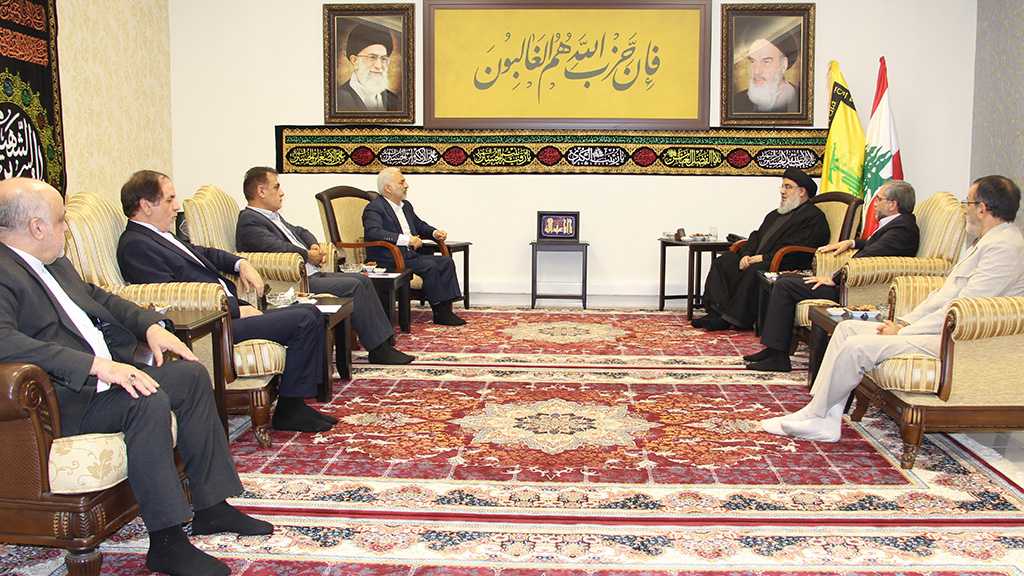
Nasrallah greets freed Heroes in Person!!!

Source: AFP, 17-7-2008
Hizbullah Secretary General Hassan Nasrallah appeared in person at public celebrations in the southern suburbs of Beirut on Wednesday to claim victory following the release of five Lebanese prisoners from "Israel".
"The period of defeat is over, and the time of victory has arrived," Nasrallah told a cheering crowd of tens of thousands of supporters.
Next to him was Samir Kantar, freed earlier Wednesday from an "Israeli" prison along with four Hizbullah fighters as part of a prisoner swap.
"This people and this nation and this country that gave a clear picture to the world... cannot be defeated," Nasrallah said.
The prisoner exchange deal saw the five Lebanese prisoners turned over for the bodies of two "Israeli" soldiers Hizbullah had captured in a border raid in 2006, Eldad Regev and Ehud Goldwasser.
Their capture sparked a devastating 34-day war between Hizbullah and "Israel" in which over 1,200 Lebanese, mostly civilians, and over 160 "Israelis", mostly soldiers, were killed.
Nasrallah said that by not revealing the fates of the captured soldiers, his group had been put in a position of strength in negotiating the swap.
"Had their fates been revealed in a tactical error, the negotiations would have taken a different course," he said.
"If we had been defeated in July 2006, Samir and the martyrs would not have been returned today," he later told the crowd appearing on a screen standing in front of a blue curtain with a white dove carrying a banner that said "the Radwan Operation."
Hizbullah has dubbed the swap the Radwan Operation after the alias used by Hizbullah military commander Imad Mognieh, who was killed in a bombing in Syria in February for which Hizbullah has blamed "Israel".
Nasrallah said, "Our only concern is to defend our country, its territory, its water and its people, and [we] are open to all discussion for a national defense strategy to do that."
Newly-elected President Michel Suleiman, who greeted the prisoners at the airport, called for the formation of a national defense strategy in his inaugural speech in May.
Nasrallah called on Lebanese factions to reunite and "overcome sensitivities and move away from grudges and take advantage of the opportunity to address the problems in a spirit of solidarity in the national unity government."
A Lebanese national unity cabinet was formed on Friday after a debilitating political crisis left a six-month void in the presidency and culminated in a Hizbullah-led takeover of West Beirut in May.
"Within the framework of a national unity government, we are willing to cooperate in dealing with all the issues without exception in order to serve the national interest and unity," Nasrallah added.
Kintar told the cheering crowds he thanked God for giving him the strength to endure his almost three-decade imprisonment, which made him the longest-serving Arab prisoner in "Israel".
"Thank God we arrived to this day; this day of victory, never to return to a day of defeat. Thank God, who gave me strength... and who always gave me hope in the moments of weaknesses," Kintar said.
"Thank God, who gave me the ability to endure challenge and face imprisonment. Thank God, (who) resurrected in this country a resistance, this great Islamic Resistance," he added.
The last time Nasrallah gave a public speech was in September 2006 in a victory celebration among the ruins of the southern suburbs of Beirut destroyed during the 2006 July War Hizbullah fought with "Israel" after Regev and Goldwasser had been captured.
He appeared in public for a few minutes among crowds in January during the Shia Muslim holiday of Ashoura.
Hizbullah Secretary General Hassan Nasrallah appeared in person at public celebrations in the southern suburbs of Beirut on Wednesday to claim victory following the release of five Lebanese prisoners from "Israel".
"The period of defeat is over, and the time of victory has arrived," Nasrallah told a cheering crowd of tens of thousands of supporters.
Next to him was Samir Kantar, freed earlier Wednesday from an "Israeli" prison along with four Hizbullah fighters as part of a prisoner swap.
"This people and this nation and this country that gave a clear picture to the world... cannot be defeated," Nasrallah said.
The prisoner exchange deal saw the five Lebanese prisoners turned over for the bodies of two "Israeli" soldiers Hizbullah had captured in a border raid in 2006, Eldad Regev and Ehud Goldwasser.
Their capture sparked a devastating 34-day war between Hizbullah and "Israel" in which over 1,200 Lebanese, mostly civilians, and over 160 "Israelis", mostly soldiers, were killed.
Nasrallah said that by not revealing the fates of the captured soldiers, his group had been put in a position of strength in negotiating the swap.
"Had their fates been revealed in a tactical error, the negotiations would have taken a different course," he said.
"If we had been defeated in July 2006, Samir and the martyrs would not have been returned today," he later told the crowd appearing on a screen standing in front of a blue curtain with a white dove carrying a banner that said "the Radwan Operation."
Hizbullah has dubbed the swap the Radwan Operation after the alias used by Hizbullah military commander Imad Mognieh, who was killed in a bombing in Syria in February for which Hizbullah has blamed "Israel".
Nasrallah said, "Our only concern is to defend our country, its territory, its water and its people, and [we] are open to all discussion for a national defense strategy to do that."
Newly-elected President Michel Suleiman, who greeted the prisoners at the airport, called for the formation of a national defense strategy in his inaugural speech in May.
Nasrallah called on Lebanese factions to reunite and "overcome sensitivities and move away from grudges and take advantage of the opportunity to address the problems in a spirit of solidarity in the national unity government."
A Lebanese national unity cabinet was formed on Friday after a debilitating political crisis left a six-month void in the presidency and culminated in a Hizbullah-led takeover of West Beirut in May.
"Within the framework of a national unity government, we are willing to cooperate in dealing with all the issues without exception in order to serve the national interest and unity," Nasrallah added.
Kintar told the cheering crowds he thanked God for giving him the strength to endure his almost three-decade imprisonment, which made him the longest-serving Arab prisoner in "Israel".
"Thank God we arrived to this day; this day of victory, never to return to a day of defeat. Thank God, who gave me strength... and who always gave me hope in the moments of weaknesses," Kintar said.
"Thank God, who gave me the ability to endure challenge and face imprisonment. Thank God, (who) resurrected in this country a resistance, this great Islamic Resistance," he added.
The last time Nasrallah gave a public speech was in September 2006 in a victory celebration among the ruins of the southern suburbs of Beirut destroyed during the 2006 July War Hizbullah fought with "Israel" after Regev and Goldwasser had been captured.
He appeared in public for a few minutes among crowds in January during the Shia Muslim holiday of Ashoura.
Comments
person INTAZAR MEHDI BALOCH
CONGRATULAYIONS
Thanks SYED HASSAN NASRULLAH & Hizbullah for giving us such a nice Gift on 13 Rajab. Long Live hassan Nasrullah.person Syed Rizwan Hider
I like to much
Asslam o Alkkam I am very Happy to see the Acctivites of Hizbbollah and my lot of sallam to leader of Hizbollah Syed Hassan Nasrullah i praise to allah to save him life from to the enimies of islam. Huda hafiz


